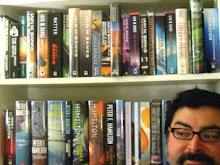Ginger is in the middle of getting upgrades (no, I won't make reference to cosmetic surgery), and I've taken to thinking of the process as what they did to Jaime Somers in the Bionic Woman. Fitter, Better, Smarter, Stronger. My preference is to think about the short-lived remake rather than the original (I have a thing for that Michelle Ryan-- rowrrr!).
I watched the technicians for a bit, dismantling plexi-glass, mountings... but when they pulled out the drills I had to leave. It was all a bit too intimate. Like watching major surgery on a relative. In just over 24 hours Ginger will be up and running again with new features and doo-hickeys (yes, that is a technical term) that hopefully won't take long to adjust to. It was odd to not have access to Ginger the whole day, like ghost limb syndrome or something. So I wandered over to the bookstore and did a thorough check on my only section (Graphica, which, due to the hectic nature of TPPress of late, I haven't taken care of properly). When I came back later in the afternoon, the Techs were gone, off to Village Books to help the operator fix a few glitches on her machine. This gave me an opportunity to quietly work on more book design projects, have a meeting with an author I'm excited to be working with (more details as they unfold), catch up on Twitter and find myself being followed (on Twitter, not in real life) by rising literary star Nick Harkaway . Cool.
Jules Verne. Several weeks ago I received an email from J. who politely asked me if I could print the book attached to the link below his sentence. I did and was very surprised by what was there: "Journey to the Center of the Earth". So what? you might say? It's in Hebrew. Printed in 1878. Published in Poland, rebound in the 1950s in Charlestown, Mass., ultimately residing in the Harvard University library. Wow. After several emails back and forth, I contacted Google, who O.K'd the one-off printing.
But I was feeling cocky. I told J. that not only would I make the book for him, I would print it in the Hebrew fashion (Hebrew is read from right to left). So after a couple of weeks of dabbling, I managed to make it. You'll notice two books in the photo below, and that's because during the process J. wanted me to print "20,000 Leagues Under the Sea", in Hebrew, from 1878. The original scans were a tad spotty, the Hebrew type was a bit small, but for a scholar, easy access to a work like this more than makes up for the roughness of the PDF.
Post-apocalyptic this, Post-apocalyptic that.
O.K., great. another SF trope is being embraced on a large scale. "The Road" by Cormac McCarthy is but one example of the hot new trend in literature: _____ - Apocalypse (Post-, Zombie-, Vampire-, Barbie-). And this article chronicles the increasing speed that YA publishers and their readers are eating up the books.
My problem is that most of these are not Post-Apocalyptic (dictionary: predicting or presaging imminent disaster and total or universal destruction.). Now I can see, growing up in the 1980s that Post-Apocalyptic referred to a Nuclear exchange, which would bring about the dictionary definition above, but the vast bulk of books being published don't fit the bill.
Ahhh! An EMP pulse destroys all electronics! Post-Apocalyptic!
An earthquake destroys most Californian cities! Post-Apocalyptic!
Vampires come out of the dark and battle humans! Post-Apocalyptic!...
Not really. Ok, maybe the last one is close. I think we need to refer to most of these books as Post-Society novels. The deconstruction of societal norms does not an Apocalypse make. Even global events don't neatly qualify as Apocalyptic conditions.
I'm a big believer in talking about writing in the correct way, and even scholars make the mistake of talking 'genre' when they should be talking 'technique.' It's a meme-thing: once 'genre' slips out of a person's mouth, the people in the room shift in their seats and develop walls (even at SF & Fantasy conventions this occurs); it becomes a 'which genre is better' dialogue and nobody ever learns anything.
The point I'm always making is that the hottest writers out there (including Mr. McCarthy) are hot because they are breaking the pre-established literary divisions by using any tool in the writer's kit-bag to tell their story. In the case of "The Road", McCarthy realized that he needed the elements of a 'dystopian/apocalyptic', dare I say it, Post-societal story, to get to the essence of the emotional reactions he needed from his characters, and to properly address the themes he was ruminating upon.
So here's to the flood of post-society novels! Long may they crumble... combust...devour...um....
Wednesday, February 17, 2010
Subscribe to:
Post Comments (Atom)


No comments:
Post a Comment